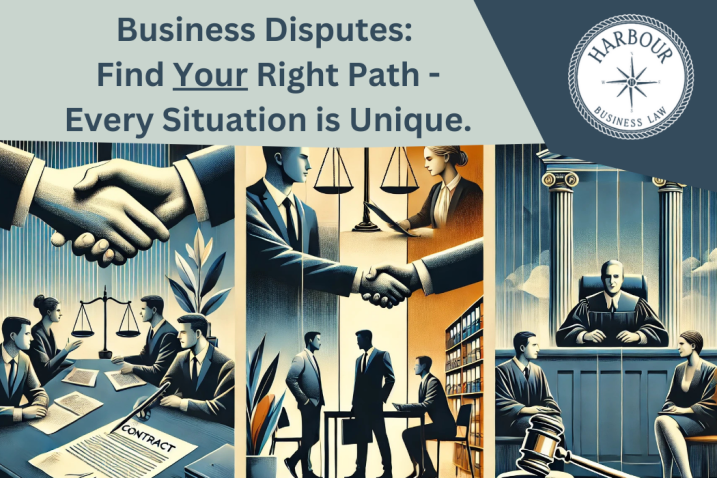
Conflicts are inevitable in business, whether they arise from contract breaches, partnership disagreements, or issues with vendors or clients. When disputes occur, determining the best course of action can be challenging. Should you litigate, mediate, or settle? Each option has its pros and cons, and the right choice depends on the specifics of your situation. This guide explores these approaches to help you navigate disputes effectively and protect your business interests.
Settlement: Reaching an Agreement
A settlement involves negotiating an agreement outside of court, often through direct communication or with the assistance of attorneys.
Pros of Settling:
Cons of Settling:
When to Choose Settlement: Settling is often the best option when all parties can agree on terms without the need for third-party intervention or court involvement.
Mediation: Finding Common Ground
Mediation is a cooperative process where a neutral third party assists the disputing parties in finding a mutually acceptable resolution. It’s a less formal and more flexible alternative to litigation.
Pros of Mediation:
Cons of Mediation:
When to Choose Mediation: Mediation is ideal when both parties are open to negotiation and wish to preserve their business relationship.
Litigation: Taking It to Court
Litigation is the process of resolving disputes within the court system. Although it is often viewed as a formal and conclusive method for addressing conflicts, it comes with its own set of advantages and disadvantages.
Pros of Litigation:
Cons of Litigation:
When to Choose Litigation: Opt for litigation when the stakes are high, the other party is uncooperative, or you need a legally enforceable decision.
Making the Right Choice
Deciding whether to litigate, mediate, or settle depends on several factors:
Consulting with Legal Experts
This blog is by no means all-encompassing, and handling business disputes can be challenging, especially when the stakes are typically high. Working with a knowledgeable business attorney help make sure you are properly assessing the options and helps you determine the most effective course of action for you and your situation. Whether it’s negotiating a favorable settlement, facilitating mediation, or navigating litigation, a seasoned business litigation attorney can provide the guidance and support you need.
Final Thoughts
Conflicts don’t need to disrupt your business. With a clear understanding of your options and guidance from professionals, you can resolve disputes efficiently, safeguard your interests, and stay focused on driving your business forward.
_____________________________________________________
Don’t have a business attorney? Get in touch with our team by emailing Info@harbourbusinesslaw.com.
_____________________________________________________
This Blog was written by Founding Attorney, Katelyn Dougherty.
DISCLAIMER: This blog is for educational purposes only and does not offer nor substitute legal advice. This blog does not establish an attorney-client relationship and is not for advertising or solicitation purposes. Any of the content contained herein shall not be used to make any decision without first consulting an attorney. The hiring of an attorney is an important decision not to be based on advertisements or blogs. Harbour Business Law expressly disclaims any and all liability in regard to any actions, or lack thereof, based on any contents of this blog.